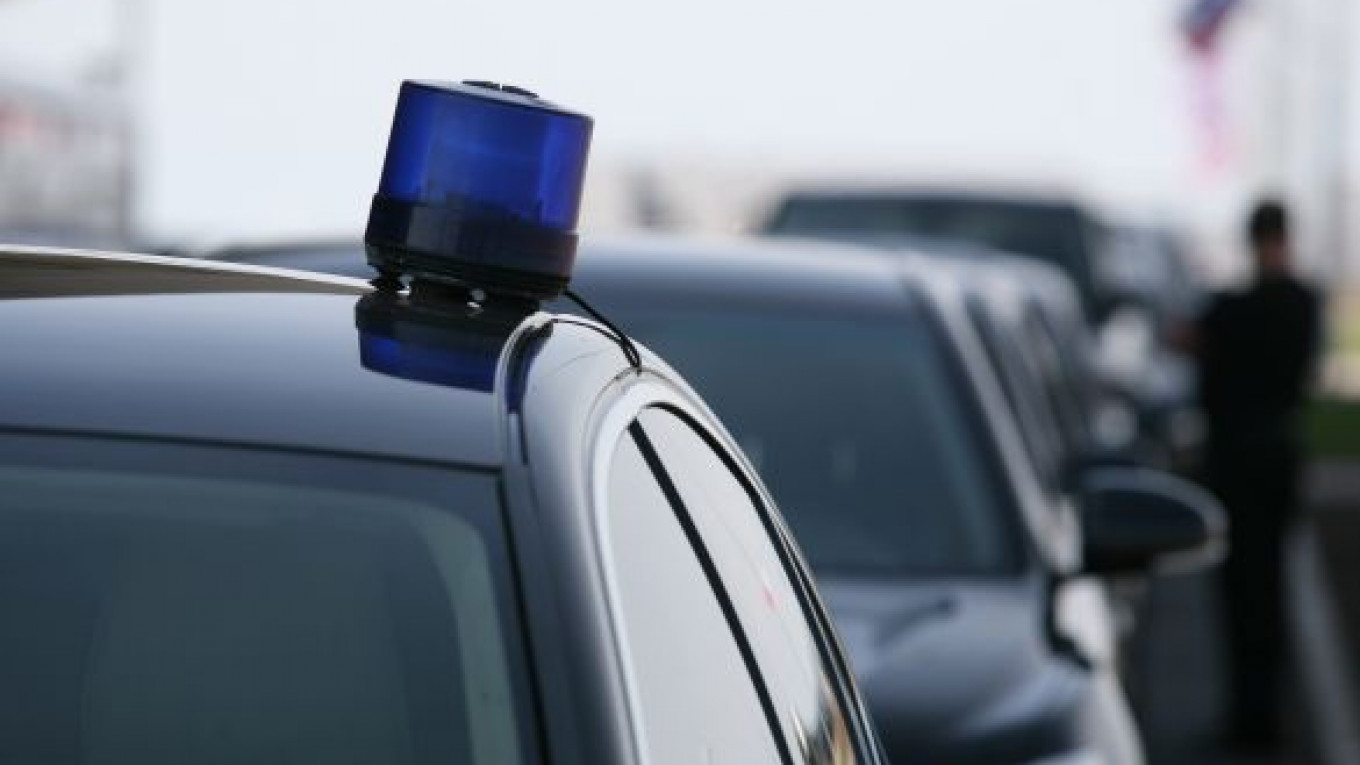As public discontent with the government persists, President Vladimir Putin on Saturday dramatically cut the number of cars that can flash blue lights to take command of the highways — and drive other motorists mad.
The move, which makes good on Putin's presidential campaign promise made in February, has the potential to temper some of the irritation that has been causing the recent protests.
The decree released by the Kremlin slashes the number of the privileged cars to 569 from 968, or almost in half, effective as of July 1, listing greater traffic safety as one of its goals. That number is in addition to emergency vehicles.
The widespread use of the flashing lights, sometimes installed fraudulently on cars not eligible to use them, gave rise to the Blue Buckets movement in Moscow, where cars with the lights often bring traffic to a standstill.
Motorists bonded together in April 2010 to report blatant abuses of the lights, which give a car the power to disregard the speed limits and other road signs. At the beginning, members adorned their cars with blue buckets that children play with in sandboxes.
Police said in March that there shouldn't have been a flashing blue light on the car carrying former Sverdlovsk region Governor Alexander Misharin that collided with two other cars outside of the regional capital in December in an accident that killed one of the drivers. Misharin and his driver suffered grave injuries.
First Deputy Director of the Federal Customs Service Vladimir Malinin broke speed limits in a car with flashing blue lights to pick up a suit from a Moscow dry cleaner's in June, news reports said.
Putin's decree gives the most road supremacy rights to the Federal Security Service: The agency can equip 197 of its cars with the flashing lights.
The Interior Ministry is the runner-up with 100 blue lights.
The presidential administration and the Cabinet will have 20 and 28 of these cars, respectively. The other executive branches, including governors, will also enjoy the privilege.
The State Duma, the parliament's lower house, will have eight such cars, and the Federation Council, the upper house, five.
Putin promised to tighten the screws on the flashing blue lights during a meeting with his supporters on Feb. 7 in response to complaints.
“It's quite difficult to wage a war against the people who enjoy this [privilege],” he said at the time. “We make them fewer, but they grow back like mushrooms.”
Sergei Neverov, a senior member of the pro-government United Russia party, proposed Saturday to increase fines and introduce more serious punishment for illicit installation of the lights.
A coordinator of the Blue Buckets group said they would push for a near complete phasing out of the flashing lights for officialdom.
“We will continue our fight to make driving with a flashing blue light difficult and force their owners to give up the use of this advantage on the road,” the coordinator, Pyotr Shkumatov said, Interfax reported. “We hoped their number will come down to a few dozen.”
The Motorists of the Russia Federation voiced a similar sentiment. Its leader Sergei Kanayev said officials should forfeit special powers on the highways altogether, leaving the flashing lights to emergency services. The group will keep campaigning for the “equality of all people on the road,” he said.
Opposition political leaders have cast doubt on the efficacy of Putin's measure.
Just Russia Duma Deputy Gennady Gudkov said the blue lights would inevitably multiply again, as they are strongly sought-after as a status symbol.
Yabloko Party chairman Sergei Mitrokhin called for the blue lights to flash only on the cars of the country's four top figures: the president, the prime minister and the speakers of the two chambers of the parliament.
“It just reduces a little the range of people that will, with the help of the flashing lights, publicly demonstrate their highly privileged position and status,” he said.
A Message from The Moscow Times:
Dear readers,
We are facing unprecedented challenges. Russia's Prosecutor General's Office has designated The Moscow Times as an "undesirable" organization, criminalizing our work and putting our staff at risk of prosecution. This follows our earlier unjust labeling as a "foreign agent."
These actions are direct attempts to silence independent journalism in Russia. The authorities claim our work "discredits the decisions of the Russian leadership." We see things differently: we strive to provide accurate, unbiased reporting on Russia.
We, the journalists of The Moscow Times, refuse to be silenced. But to continue our work, we need your help.
Your support, no matter how small, makes a world of difference. If you can, please support us monthly starting from just $2. It's quick to set up, and every contribution makes a significant impact.
By supporting The Moscow Times, you're defending open, independent journalism in the face of repression. Thank you for standing with us.
Remind me later.






